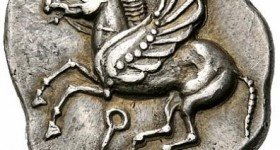Mediterranean Identities Conference Report
Two weeks ago, from the 26th to the 28th March, the International Conference „Mediterranean Identities: Formation and Transformation” took place in Leicester. This was part of the successful and long standing collaboration between the Department of Classics at the University of Nottingham and the School of Archaeology and Ancient History at the University of Leicester. The participants, who came from around the globe and represented all five continents, had only one aim in mind: To discuss Identities.
On Friday morning, I arrived an hour and a half earlier than the anticipated time at the venue in order to make certain that everything will run smoothly. At that point not even the reception was open. And yet, some of our delegates were already in the room, eager for the commencement of the proceedings. The trend continued over the next two days, signifying the interest that the topic arose to the people present at the conference.
As expected, the starting point was not a straightforward one. From the beginning we faced problems with the photocopies, the computer and other minor details that can create havoc when they all happen at the same time. The Leicester University conference office has been most unhelpful, despite the hefty fee they got paid. Mark and I have been left in our own devices, trying to sort out the registration, setting up the powerpoint presentations, chairing the papers and, last but not least, twittering. Amidst the chaos, broadcasting the conference through twitter did not happen for the first few hours. Only when the dust settled have I managed to write a few lines for each paper.
The next few days no major crisis took place. The highlight of the meeting was, of course, the four course meal we enjoyed at Kayal, a southern Indian restaurant at the center of Leicester. It was an excellent introduction to Indian cuisine, especially for those who have never tasted Indian food before. We stayed there for hours sampling one dish after the other, without realizing that it was already midnight and some of the people had to catch the last train back to Nottingham.
With regard to the intellectual aspect of the conference, I have to admit that I am more confused than ever. Before the meeting started I was persuaded that I had a fair idea about the subject of Identities and that I knew what direction should be taken in order to advance such studies. This is no longer the case. For three whole days we have been questioning the very definition of Identity and the subcategories it consists of. For three whole days we have been trying to find ways to overcome the myriad problems such studies entail and to develop a coherent and acceptable to all methodology. So far, we have agreed that we disagree. The level of disagreement became even more acute when some of the participants declared openly that Identities should not be studied at all and under any circumstances. And although I am against such nihilistic approaches, I would have to agree that the topic is infested with misunderstandings, obscure statements, unclear boundaries, ambiguous methodologies and sociological theoretical models that cannot always be applied to the ancient world. On the whole, it‘s a mess!
Therefore, it is imperative for at least some of the papers to be published in a collective volume that will deal mainly with the Theory of Identities in the Ancient World. I hope that such a volume will become a “How To” guide to ancient historians, archaeologists and classicists, who aspire to study the subject. The shortcomings of such a publication are self evident, given the complexity of the issues. However, I remain hopeful that the book will be a valuable addition to the existing publications, it will offer a rounded overview of the study of Identities, and it will indicate the “right” way forward.


Identity is a funny subject; it almost is the inertia of history. It’s the glue that holds the whole subject together, without it we would have to abandon any history which tries to deal with a group. We could only deal with history of individuals. Without the feel for a collective identity many events wouldn’t have happened.
I did a history module on British national identity and it was fascinating, but because identity is commonly the elephant in the room within all historical texts (as in it plays an important part throughout all history, but is rarely mentioned head on possibly due to the fact that it was quite obvious, or at least they thought it was quite obvious to the writer) it is very hard to follow and actually write about identity directly.
Dealing with identity for any era seems to me to be something which should be quite transferable from the ancient to the modern , as long as you accept human nature hasn’t change too much. We all want to belong, maybe technology has changed this slightly but the core instinct should have always been there.
The role of identity may be hard to follow, but cannot be ignored. What was the slave identity in Spartacus’ rebellion? What about followers of Julius Caesar, it may be hard and very messy, but I agree with Constantina that it cannot be ignored.